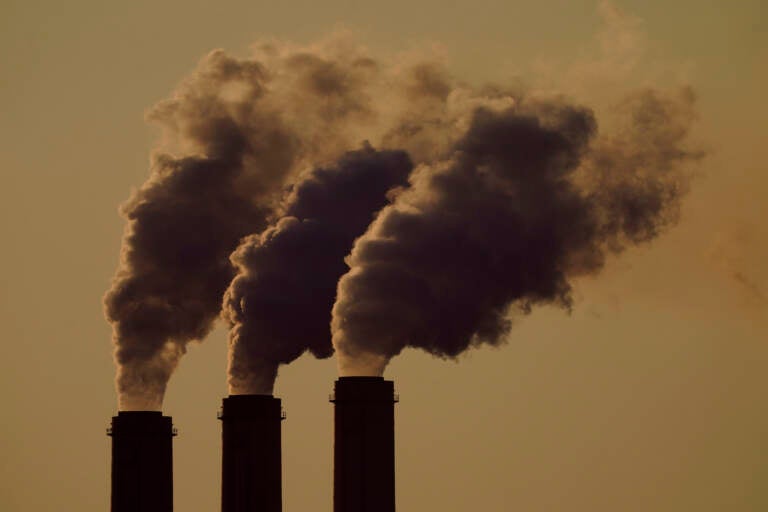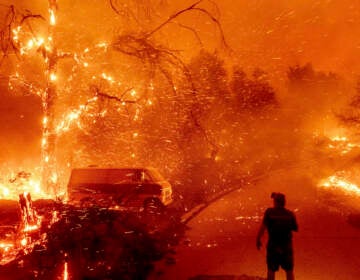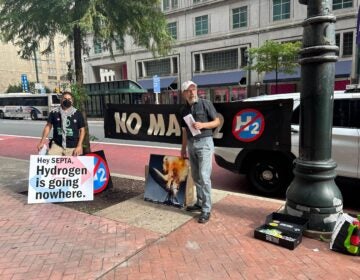Switch to electric buildings or miss climate goals, N.J. advocates say
The analysis calls on the state to step up efforts to transition buildings to electric power and to end heating homes with natural gas and other fossil fuels.

File photo: In this Saturday, Sept. 18, 2021 file photo, emissions rise from the smokestacks at the Jeffrey Energy Center coal power plant as the suns sets, near Emmett, Kansas. (AP Photo/Charlie Riedel, File)
This story originally appeared on NJ Spotlight.
New Jersey is falling behind neighboring states in reducing greenhouse-gas emissions from homes and buildings — a trend that threatens the state’s goal of slashing global-warming pollution, according to a report by a nonprofit advocacy group.
The analysis by the Acadia Center, commissioned by the New Jersey Conservation Foundation, calls on the state to step up efforts to transition buildings to electric power and to end heating homes with natural gas and other fossil fuels. Power to heat and cool buildings represents the second-largest source of greenhouse-gas emission in the state, behind vehicle emissions — accounting for about a quarter of the pollution responsible for climate change.
The report recommends a range of new policies and incentives to accelerate the replacement of gas-fired and oil-fueled furnaces with electric appliances. That includes using cold-climate heat pumps that can not only heat homes in negative temperatures, but also provide highly efficient air conditioning.
In a state where more than 75% of the public relies on natural gas to heat homes, the idea of converting homes to heat pumps is probably the most controversial aspect of the plan by Gov. Phil Murphy’s administration to transition to 100% clean energy by 2050.
The Senate approved a bill to prohibit state agencies from mandating electric heating systems earlier this year. The bill died when it failed to win approval in the Assembly at the end of the last legislative session in early January. Clean-energy advocates say there are no plans to mandate a conversion to electrified buildings.
Costs at issue
For the most part, criticism focuses on the cost of conversion to heat pumps, which work by gathering heat from one location and transferring it to another, rather than generating heat.
According to data based on conversions in other states in the Northeast, typical costs range from $4,000 to $7,000. Opponents, however, claim the actual costs are much higher, ranging as much as $20,000.
Proponents argued Tuesday that by electrifying buildings, consumers will see lower annual operating costs for a typical home in New Jersey equipped with an average level of weatherization.
The average home would save about $50 annually, even assuming very low gas prices, such as those from the winter of 2020-2021. By combining electric appliances with home weatherization measures, many homeowners in the state can reduce their energy bills by more than 50%, the report said.
“When combined with weatherization, New Jerseyans will save money and improve local health by electrifying their homes,’’ said Amy Boyd, director of policy at the Acadia Center. “New Jersey can follow the framework set by fellow Northeast states to successfully, quickly and affordably switch to an electric future.’’
For instance, Massachusetts offers incentives ranging from $4,000 to $10,000 to convert to cold-climate heat pumps, Boyd said. It also is important to target poorly insulated homes for such conversions, she said, noting they account for half of all greenhouse-gas emissions in the state.
Incentives needed
Sen. Andrew Zwicker (D-Mercer) said if the state offers incentives that reduce upfront costs, consumers will be more willing to switch to an electric system, which otherwise costs more than a conventional gas or oil furnace.
The state’s Energy Master Plan recommends converting 22% of buildings to electric heat pumps by 2030, a target that proponents say is not aggressive enough to achieve the state’s clean-energy goal.
The state master plan also says New Jersey should convert 90% of residential and commercial buildings from natural gas to electric appliances by 2050.
“New Jersey needs to start developing the policies and incentives to advance building electrification in a way that benefits consumers, supports low- and moderate-income communities, and reduces harmful indoor emissions,’’ said Tom Gilbert, campaign director of ReThink New Jersey and New Jersey Conservation Foundation.
New Jersey ranks seventh among states in the nation with most premature deaths, with over 250 from outdoor air pollution directly related to combustion in buildings from gas, oil and propane, according to research from the Harvard T.H. Chan School of Public Health.
WHYY is your source for fact-based, in-depth journalism and information. As a nonprofit organization, we rely on financial support from readers like you. Please give today.





